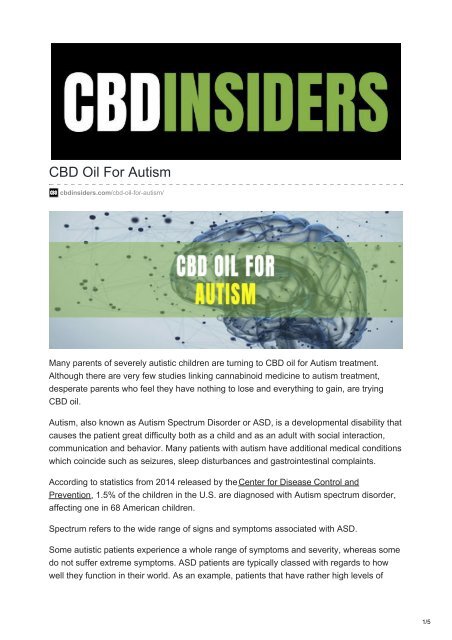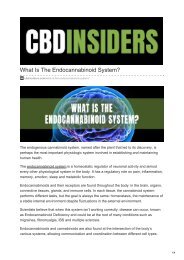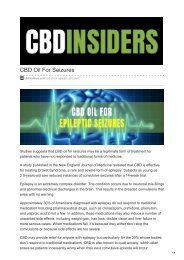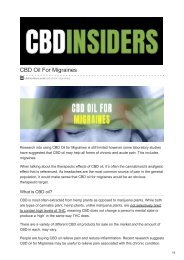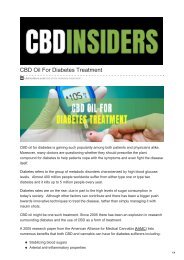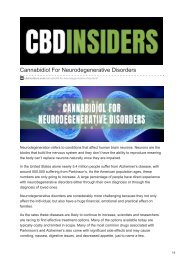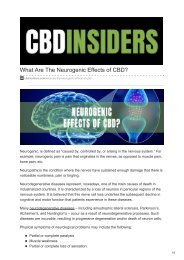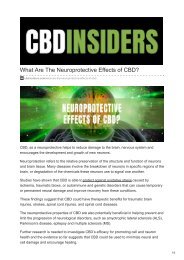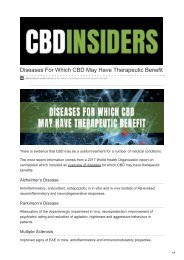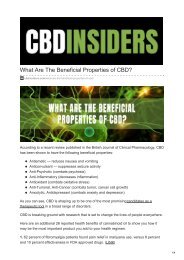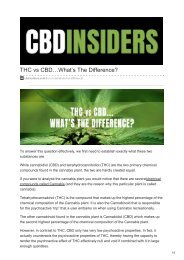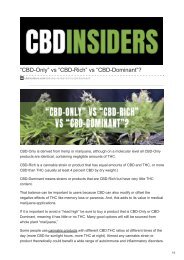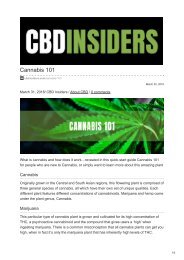CBD Oil For Autism
Many parents of severely autistic children are turning to CBD oil for Autism treatment. Although there are very few studies linking cannabinoid medicine to autism treatment, desperate parents who feel they have nothing to lose and everything to gain, are trying CBD oil. Autism, also known as Autism Spectrum Disorder or ASD, is a developmental disability that causes the patient great difficulty both as a child and as an adult with social interaction, communication and behavior. Many patients with autism have additional medical conditions which coincide such as seizures, sleep disturbances and gastrointestinal complaints. According to statistics from 2014 released by the Center for Disease Control and Prevention, 1.5% of the children in the U.S. are diagnosed with Autism spectrum disorder, affecting one in 68 American children.
Many parents of severely autistic children are turning to CBD oil for Autism treatment. Although there are very few studies linking cannabinoid medicine to autism treatment, desperate parents who feel they have nothing to lose and everything to gain, are trying CBD oil.
Autism, also known as Autism Spectrum Disorder or ASD, is a developmental disability that causes the patient great difficulty both as a child and as an adult with social interaction, communication and behavior. Many patients with autism have additional medical conditions which coincide such as seizures, sleep disturbances and gastrointestinal complaints.
According to statistics from 2014 released by the Center for Disease Control and Prevention, 1.5% of the children in the U.S. are diagnosed with Autism spectrum disorder, affecting one in 68 American children.
Create successful ePaper yourself
Turn your PDF publications into a flip-book with our unique Google optimized e-Paper software.
<strong>CBD</strong> <strong>Oil</strong> <strong>For</strong> <strong>Autism</strong><br />
cbdinsiders.com/cbd-oil-for-autism/<br />
Many parents of severely autistic children are turning to <strong>CBD</strong> oil for <strong>Autism</strong> treatment.<br />
Although there are very few studies linking cannabinoid medicine to autism treatment,<br />
desperate parents who feel they have nothing to lose and everything to gain, are trying<br />
<strong>CBD</strong> oil.<br />
<strong>Autism</strong>, also known as <strong>Autism</strong> Spectrum Disorder or ASD, is a developmental disability that<br />
causes the patient great difficulty both as a child and as an adult with social interaction,<br />
communication and behavior. Many patients with autism have additional medical conditions<br />
which coincide such as seizures, sleep disturbances and gastrointestinal complaints.<br />
According to statistics from 2014 released by the Center for Disease Control and<br />
Prevention, 1.5% of the children in the U.S. are diagnosed with <strong>Autism</strong> spectrum disorder,<br />
affecting one in 68 American children.<br />
Spectrum refers to the wide range of signs and symptoms associated with ASD.<br />
Some autistic patients experience a whole range of symptoms and severity, whereas some<br />
do not suffer extreme symptoms. ASD patients are typically classed with regards to how<br />
well they function in their world. As an example, patients that have rather high levels of<br />
1/5
intelligence and for the most part have normal speech would be considered high<br />
functioning, whereas a child who doesn’t speak at all – would be considered a low<br />
functioning ASD patient.<br />
You can likely comprehend the large difference between zero verbal communication to the<br />
ability to communicate effectively. Therefore, <strong>Autism</strong> can not be treated by any one drug, or<br />
any one technique due to the fact that each and every patient will need something<br />
specifically tailored to their set of symptoms.<br />
Causes of <strong>Autism</strong><br />
It is commonly believed that <strong>Autism</strong> is most often genetically passed on. The chances of a<br />
child being born with <strong>Autism</strong> increases when one or both parents are of an older age.<br />
Chances may also increase when a pregnant mother is exposed to toxins, drinks or<br />
smokes during pregnancy. It may also caused by abnormalities in the brain area that<br />
interprets sensory input.<br />
Symptoms of <strong>Autism</strong><br />
Symptoms associated with <strong>Autism</strong> are often seen very early in a child’s development and<br />
may include any of the items on this list of autistic traits typically found in the ASD patient:<br />
<strong>For</strong> children:<br />
Difficulty developing non-verbal communication, skills, body language and facial<br />
expressions<br />
No interest in sharing or enjoying the company of another<br />
Difficulty establishing friendships with kids of similar age<br />
Delayed speech – 40% patients never speak<br />
No empathy. Difficulty understanding what another is feeling e.g. pain or sorrow<br />
Inability to continue a conversation with someone<br />
Difficulty initiating a conversation with someone<br />
Difficulty understanding what their listener has perceived from the conversation<br />
Repetition of certain words<br />
Learning difficulties<br />
Heightened sensory sensitivity<br />
<strong>For</strong> adults:<br />
Learning difficulties<br />
Rigid routine to keep life in balance<br />
Exhibits unusual behavior<br />
Unusually intense focused interests<br />
Heightened sensitivity to sounds / sensory sensitivity<br />
Hand flapping / Spinning<br />
Obsessive Compulsive<br />
Repetitive use of objects<br />
Unusual sensory interest<br />
2/5
Other than a long list of medications for the treatment of <strong>Autism</strong> Spectrum Disorder, there<br />
are also a number of alternative treatments and therapies available to the autistic patient,<br />
including:<br />
Early intervention<br />
Cognitive behavior therapy<br />
Behavioral management<br />
Joint attention therapy<br />
Educational strategies<br />
Occupational<br />
Nutritional<br />
Physical therapy<br />
Parent-mediated<br />
Speech-language therapy<br />
Social skills training<br />
<strong>CBD</strong> oil may help regulate emotional states and focus. It is also known to be a<br />
neuroprotective agent that could work against brain degradation. <strong>CBD</strong> may also be an<br />
effective treatment in mood regulation, decreasing anxiety, rage and hostility that occurs in<br />
<strong>Autism</strong> patients.<br />
Although not formally tested, promising results have shown the use of Cannabidiol (<strong>CBD</strong>) in<br />
the treatment of the hypersensitivity to physical sensations, noises, smells and the<br />
hyperactivity associated with the disorder.<br />
Researchers have also found what they believe to be a potential link between autism and<br />
cannabinoid receptors, particularly cannabinoid CB2 receptors within the endocannabinoid<br />
system. These findings regarding the CB2 receptors support the theory that autism could<br />
be caused by a disruption of the brain’s ability to send clear signals. This, in turn, raises the<br />
possibility that using cannabinoids found in cannabis can restore communication to allow<br />
for proper cell function and communication<br />
While further research needs to be done involving the treatment of autism with <strong>CBD</strong>, there<br />
is anecdotal evidence that says <strong>CBD</strong> oil for <strong>Autism</strong> may present an effective treatment<br />
option.<br />
References:<br />
Endocannabinoid Signaling in <strong>Autism</strong><br />
Targeting the endocannabinoid system in the treatment of fragile X syndrome<br />
<strong>Autism</strong>-Associated Neuroligin-3 Mutations Commonly Disrupt Tonic<br />
Endocannabinoid Signaling<br />
A novel approach to the symptomatic treatment of autism<br />
An autistic child given THC for six months reported significant reductions in the<br />
symptoms of autism<br />
Endocannabinoid System as Novel Therapeutic Target for <strong>Autism</strong> Treatment<br />
Cannabinoid receptor type 2, but not type 1, is up-regulated in peripheral blood<br />
mononuclear cells of children affected by autistic disorders<br />
3/5
<strong>Autism</strong> Fact Sheet – National Institute of Neurological Disorders and Stroke<br />
What Is <strong>Autism</strong>? – <strong>Autism</strong> Speaks<br />
Cannabinoid receptor type 2, but not type 1, is up-regulated in peripheral blood<br />
mononuclear cells of children affected by autistic disorders<br />
Consequences of cannabinoid and monoaminergic system disruption in a<br />
mouse model of autism spectrum disorders<br />
Uncoupling of the endocannabinoid signalling complex in a mouse model of<br />
fragile x syndrome<br />
Mutations found in individuals with autism interfere with endocannabinoid<br />
signaling in the brain<br />
Mice with similar behavioral characteristics to autistic humans saw an enhanced<br />
reduction in depression and were able to remain focused on running on the<br />
spinning wheel apparatus<br />
<strong>Autism</strong>-associated neuroligin-3 mutations commonly disrupt tonic<br />
endocannabinoid signaling<br />
Tags <strong>Autism</strong>CannabidiolCannabinoid <strong>Oil</strong>CannabinoidsCannabisCannabis <strong>Oil</strong>Cannabis<br />
PlantCB1CB2<strong>CBD</strong><strong>CBD</strong> Extract<strong>CBD</strong> <strong>Oil</strong><strong>CBD</strong> SupplementHempHemp <strong>Oil</strong>Therapeutic<br />
Related posts<br />
<strong>CBD</strong> <strong>Oil</strong> <strong>For</strong> Fibromyalgia<br />
4/5
<strong>CBD</strong> <strong>Oil</strong> <strong>For</strong> Migraines<br />
<strong>CBD</strong> <strong>Oil</strong> <strong>For</strong> Arthritis<br />
5/5


